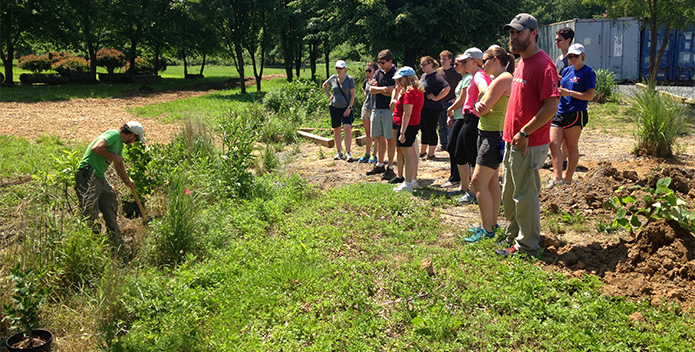When you think of a farm, you might imagine a picturesque barn with rolling hills dotted with cows or perfect, straight rows of tomatoes. While that can be a realistic image, the Brookeville Beer Farm looks a lot different. With hops, berries, mushrooms, and honey, this farm is growing ingredients to brew beer.
Since 2012, when Maryland passed the Farm Brewery Manufacturer's License, farms can open a brewery on their property given they grow at least one ingredient. In the years following, over a dozen farm breweries opened their doors and found that using Maryland agricultural products creates a unique beer that customers love.
A farm brewery is not just a local business, but a local grower. A truly local product results from using a mix of products like hops or honey produced on their property with wheat from a neighbor, or pumpkins from another.
Making the connection between a local brewery and water quality is surprisingly simple. The Buy Fresh Buy Local Chesapeake chapter encourages consumers to support local and sustainable food sources in the Chesapeake Bay Watershed. This includes everything from where to get a Thanksgiving turkey to a creamery for some of the best ice cream Maryland has to offer. Buying local products, even beer from a local brewery, reduces transport and packaging which use a great deal of natural resources.
Choosing to buy local even contributes to the local community. A dollar spent at a small business, like a craft brewery, cycles through the local economy almost three times more than a dollar spent at your regular grocery store.
In early June, volunteers gathered at the Brookeville Beer Farm for a workshop about how beer fits into the local food movement, followed by a planting of native trees and shrubs on the farm. After hearing from CBF's Restoration Scientist Rob Schnabel, co-owner Phil Muth, and brewer Kenny Borkmann about agriculture in Maryland and its role in the brewing industry, a tour of the farm through rows of tiny hops, past honey bees, and patches of milkweed led to a bioswale where volunteers put over 50 native plants in the ground. Those plants will enhance the bioswale, helping trap and absorb stormwater and harmful runoff from the parking lot.
After finishing the hard work, it was only a short walk back to the patio for a tasting. Whether it's planting trees or drinking a beer, there is a way for everyone to support a healthy Chesapeake Bay.
Nora Jackson
Issues in this Post
Agriculture Conservation Runoff Pollution CBF in Maryland Maryland Office, Annapolis



